Dive Deep into Creativity: Your Ultimate Tumblr Experience Awaits
Extreme Jobs - Blog Posts
On Top of The World – Literally
What’s one perk about applying to #BeAnAstronaut? You’re one step closer to being on top of the world.

Part of the job of a NASA astronaut is a task called spacewalking. Spacewalking refers to any time an astronaut gets out of a vehicle while in space; it is performed for many reasons such as completing repairs outside the International Space Station, conducting science experiments and testing new equipment.

Spacewalking can last anywhere from five to eight hours, and for that reason, astronauts’ spacesuits are more like mini-spacecraft than uniforms! Inside spacesuits, astronauts have the oxygen they need to breathe, water to drink and a bathroom!

Spacesuits also protect astronauts from the extreme environment of space. In Earth orbit, conditions can be as cold as minus 250 degrees Fahrenheit. In the sunlight, they can be as hot as 250 degrees. A spacesuit protects astronauts from those extreme temperatures.

To stay safe during spacewalks, astronauts are tethered to the International Space Station. The tethers, like ropes, are hooked to the astronaut and the space station – ensuring the astronaut does not float away into space.

Spacewalking can be a demanding task. Astronauts can burn anywhere from ~1500-2500 calories during one full assignment. That’s about equal to running 2/3 of a marathon.

Does spacewalking sound like something you’d be interested in? If so, you might want to APPLY to #BeAnAstronaut! Applications are open until March 31. Don’t miss your chance to!

Want to learn more about what it takes to be an astronaut? Or, maybe you just want more epic images. Either way, check out nasa.gov/astronauts for all your NASA astronaut needs!
Make sure to follow us on Tumblr for your regular dose of space: http://nasa.tumblr.com
Stop. Drop. And Apply to #BeAnAstronaut!

Feel like your place is in the stars? Are you an adventure seeker, an explorer, a person passionate about science and space? We need you!!

Applications are OPEN for our newest class of #Artemis astronauts. Once chosen, you could be the next person to step foot on the Moon and eventually embark on missions to Mars!

Do you have a friend who should apply? Tag them. Do you know someone who's still in school? Encourage them to follow their dreams and aim high.

To give you a sneak peak of what life will be like if you decide to #BeAnAstronaut, we’re taking you behind-the-scenes of astronaut life over the course of March.

APPLY NOW AND GET MORE INFORMATION HERE!
Make sure to follow us on Tumblr for your regular dose of space: http://nasa.tumblr.com
Go Behind the Scenes of Science in Space

Gravity rules everything on Earth, from how our bodies develop to what our research can reveal, but what happens when we go 250 miles up to the International Space Station?

Get ready to go behind the scenes of what it takes to get science to space, and meet the people who make it happen.

Introducing Season 4 of NASA Explorers: Microgravity. Floating isn’t just fun. Microgravity could open the door to discovery.
You’ve seen things floating in space, but why does that happen and how does it affect science being conducted aboard the International Space Station?
Microgravity makes the International Space Station the perfect place to perform research that is changing the lives of people on Earth, and preparing us to go deeper into space. This season on our series NASA Explorers, we are following science into low-Earth orbit and seeing what it takes to do research aboard the space station.
Follow NASA Explorers on Facebook to catch new episodes of season 4 every Wednesday!
Which is scarier? Launch VS re-entry?
How does it feel to take a walk in space?
What’s it like launching into space?
The ranks of America’s Astronaut Corps grew by 11 today!
After completing more than two years of basic training, our graduating class of astronauts is eligible for spaceflight. Assignments include the International Space Station, Artemis missions to the Moon, and ultimately, missions to Mars.
The class includes 11 astronauts, selected in 2017 from a record-setting pool of more than 18,000 applicants. This was more than double the previous record of 8,000 applicants set in 1978.
Meet the graduates:
Kayla Barron

“If you don’t love what you’re doing, you’re not going to be good at it. I think it’s a combination of finding things that you really love that will also be really challenging and will force you to grow along the way.”
This Washington native graduated from the U.S. Naval Academy with a bachelor’s degree in systems engineering. As a Gates Cambridge Scholar, which offers students an opportunity to pursue graduate study in the field of their choice at the University of Cambridge. Barron earned a master’s degree in nuclear engineering.
As a Submarine Warfare Officer, Barron was part of the first class of women commissioned into the submarine community, completing three strategic deterrent patrols aboard the USS Maine.
Zena Cardman

“Every STEM opportunity that I have ever gone down is because of some mentor who inspired me or some student who was ahead of me in school who inspired me.”
Zena Cardman is a native of Virginia and completed a bachelor’s degree in biology and master’s degree in marine sciences at The University of North Carolina, Chapel Hill. Her research has focused on microorganisms in subsurface environments, ranging from caves to deep sea sediments.
An intrepid explorer, Cardman’s field experience includes multiple Antarctic expeditions, work aboard research vessels as both scientist and crew, and NASA analog missions in British Columbia, Idaho, and Hawaii.
Raja Chari

“I grew up with the mentality that education is truly a gift not to be taken for granted.”
This Iowa native graduated from the U.S. Air Force Academy in 1999 with bachelor’s degrees in astronautical engineering and engineering science. He continued on to earn a master’s degree in aeronautics and astronautics from Massachusetts Institute of Technology (MIT) and graduated from the U.S. Naval Test Pilot School.
Chari served as the Commander of the 461st Flight Test Squadron and the Director of the F-35 Integrated Test Force. He has accumulated more than 2,000 hours of flight time in the F-35, F-15, F-16 and F-18 including F-15E combat missions in Operation Iraqi Freedom.
Matthew Dominick

“I get to work with incredible people that want to solve problems and are passionate about it. I really want to contribute to the world and this is how I want to do it.”
This Colorado native earned a bachelor’s degree in electrical engineering from the University of San Diego and a master’s degree in systems engineering from the Naval Postgraduate School. He also graduated from U.S. Naval Test Pilot School.
Dominick served on the USS Ronald Reagan as department head for Strike Fighter Squadron 115. He has more than 1,600 hours of flight time in 28 aircraft, 400 carrier-arrested landings and 61 combat missions.
Bob Hines

“As you get older, other things become important to you, like being a part of something that’s bigger than yourself. This human endeavor of exploration is something that’s really exciting.”
Bob Hines is a Pennsylvania native and earned a bachelor’s degree in aerospace engineering from Boston University. He is a graduate of the U.S. Air Force Test Pilot School, where he earned a master’s degree in flight test engineering. He continued on to earn a master’s degree in aerospace engineering from the University of Alabama.
Hines served in the U.S. Air Force and Air Force Reserves for 18 years. He also served as a research pilot at our Johnson Space Center. He has accumulated more than 3,500 hours of flight time in 41 different types of aircraft and has flown 76 combat missions in support of contingency operations around the world.
Warren Hoburg

“It was back in high school that I realized that I was really interested in engineering. I always liked taking things apart and understanding how things work and then I also really enjoy solving problems.”
Nicknamed “Woody”, this Pennsylvania native earned a bachelor’s degree in aeronautics and astronautics from MIT and a doctorate in electrical engineering and computer science from the University of California, Berkeley.
Hoburg was leading a research group at MIT at the time of his selection and is a two-time recipient of the AIAA Aeronautics and Astronautics Teaching Award in recognition of outstanding teaching.
Dr. Jonny Kim

“I fundamentally believed in the NASA mission of advancing our space frontier, all while developing innovation and new technologies that would benefit all of humankind.”
This California native trained and operated as a Navy SEAL, completing more than 100 combat operations and earning a Silver Star and Bronze Star with Combat “V”. Afterward, he went on to complete a degree in mathematics at the University of San Diego and a doctorate of medicine at Harvard Medical School.
Kim was a resident physician in emergency medicine with Partners Healthcare at Massachusetts General Hospital.
Jasmin Moghbeli

“Surround yourself with good people that have the characteristics that you want to grow in yourself. I think if you surround yourself with people like that you kind of bring each other up to a higher and higher level as you go.”
Jasmin Moghbeli, a U.S. Marine Corps major, considers Baldwin, New York, her hometown. She earned a bachelor's degree in aerospace engineering with information technology at MIT, followed by a master’s degree in aerospace engineering from the Naval Postgraduate School.
She is a distinguished graduate of the U.S. Naval Test Pilot School and has accumulated more than 1,600 hours of flight time and 150 combat missions.
Loral O’Hara

“I’m one of those people who have wanted to be an astronaut since I was a little kid, and I think that came from an early obsession with flying – birds, airplanes, rockets.”
This Houston native earned a bachelor’s degree in aerospace engineering at the University of Kansas and a Master of Science degree in aeronautics and astronautics from Purdue University. As a student, she participated in multiple NASA internship programs, including the Reduced Gravity Student Flight Opportunities Program, the NASA Academy at Goddard Space Flight Center, and the internship program at the Jet Propulsion Laboratory.
O’Hara was a research engineer at Woods Hole Oceanographic Institution, where she worked on the engineering, test and operations of deep-ocean research submersibles and robots. She is also a private pilot and certified EMT and wilderness first responder.
Dr. Frank Rubio

“I just figured it was time to take the plunge and try it. And so, I did and beyond all dreams, it came true.”
Dr. Francisco “Frank” Rubio, a U.S. Army lieutenant colonel, is originally from Miami. He earned a bachelor’s degree in international relations from the U.S. Military Academy and earned a doctorate of medicine from the Uniformed Services University of the Health Sciences.
Rubio served as a UH-60 Blackhawk helicopter pilot and flew more than 1,100 hours, including more than 600 hours of combat and imminent danger time during deployments to Bosnia, Afghanistan, and Iraq. He is also a board certified family physician and flight surgeon.
Jessica Watkins

“I’ve always been interested in exploring space. What’s out there and how can we as humans reach those outer stars and how can we learn more information about who we are through that process.”
This Colorado native earned a bachelor’s degree in geological and environmental sciences at Stanford University, and a doctorate in geology from the University of California, Los Angeles. Watkins has worked at Ames Research Center and the Jet Propulsion Laboratory.
Watkins was a postdoctoral fellow at the California Institute of Technology, where she collaborated on the Mars Curiosity rover, participating in daily planning of rover activities and investigating the geologic history of the Red Planet.
Learn more about the new space heroes right here: https://www.nasa.gov/newastronauts
Make sure to follow us on Tumblr for your regular dose of space: http://nasa.tumblr.com.
That’s a wrap folks! Gucci is signing off. Thank you for all the amazing questions. Didn’t get your question answered? No worries! We’re coming to you live next week in our second Answer Time of 2020, featuring NASA Astronaut Nick Hague. Submit your questions now here: https://nasa.tumblr.com/ask

Hi Mr Neeley, thank you for answering questions! I’ve got two things I want to know- how does the cockpit differ form a normal one? Are there special instruments in there? And do you get tired in long flights? What sort of system is in place to make sure you get sufficient rest if you are flying 12+ hours?
What are you most excited to see on your next flight? Or, what natural phenomena do you enjoy seeing the most? Thank you!
What's the weirdest part of your job? How does a typical work day for you looks like?
Hi, I'm a curious Malaysian 😁 can you explain to us about your career and how do one get to the point where you are now? Thanks! Oh, and could you comment on the recent climate crises like the Australian fires and Indonesia flooding? Thank you!
sorry, i don't know much about earth science (though it sounds very intriguing), but - what exactly is it that you do? does it take a lot of time? is it fun but challenging? was it hard to get your job? have you always wanted to work with earth science?
who was your biggest inspiration, if any, and what events led you to follow this career choice?
What’s your favorite part of the job?
I want to pursue a career in aeronautics and want to get into NASA. Any advice?
How does flying feel?
Have you ever been scared while flying? What was the event that scared you the most?What's your favorite plane to fly?
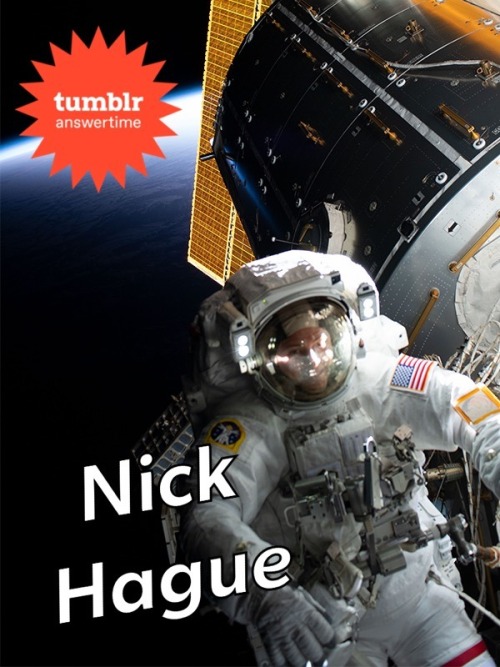
Ever wanted to ask a NASA astronaut a question? Here’s your chance!
NASA astronaut Nick Hague will be taking your questions in an Answer Time session on Thursday, January 16 from 12pm - 1pm ET here on NASA’s Tumblr! Find out what it’s like to live and work 254 miles above our planet’s surface. Make sure to ask your question now by visiting http://nasa.tumblr.com/ask!
Nick Hague was selected as one of eight members of the 21st NASA Astronaut class in 2013. Hague was the first astronaut from his class to be assigned to a mission which launched on October 11, 2018. Unfortunately, he and his crewmate Alexey Ovchinin, of the Russian space agency Roscosmos, were forced to abort the mission when a rocket booster experienced a malfunction shortly after the launch of their Soyuz MS-10. The aborted spacecraft landed safely.
His first flight to the International Space Station was from March 2019 through October 2019 as a a part of the Expeditions 59 and 60 crew. Together, the crew conducted hundreds of experiments, including investigations into devices that mimic the structure and function of human organs, free-flying robots and an instrument to measure Earth’s distribution of carbon dioxide. While at the International Space Station, Hague conducted three spacewalks, totaling 19 hours and 56 minutes with a total of 203 days in space.

Nick Hague Fun Facts:
Hague was awarded the Order of Courage from the Russian Federation for his actions during the Expedition 57/58 launch abort.
Hague was selected for the Air Force Fellows program where he was assigned as a member of the personal staff in the U.S. Senate, advising on matters of national defense and foreign policy.
He was a top flight test engineer in the U.S. Air Force.
He deployed five months to Iraq in support of Iraqi Freedom, conducting experimental airborne reconnaissance.
He enjoys exercise, flying, snow skiing and scuba.
Follow Nick Hague on Twitter at @AstroHague and follow NASA on Tumblr for your regular dose of space.
First All-Woman Spacewalk
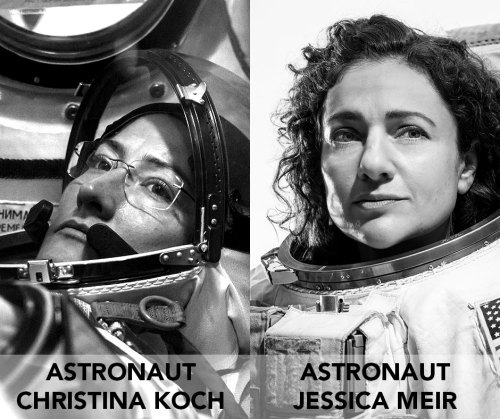
NASA astronauts and best friends, Christina Koch and Jessica Meir, made history Friday, October 18, 2019, by conducting the first all-woman spacewalk outside the International Space Station (ISS)! The Expedition 61 flight engineers ventured into the vacuum of space at 7:38 a.m. EDT to swap out a failed power controller that regulates the batteries used to collect and distribute power to the orbital laboratory – a task that took a total of seven hours and 17 minutes to complete.
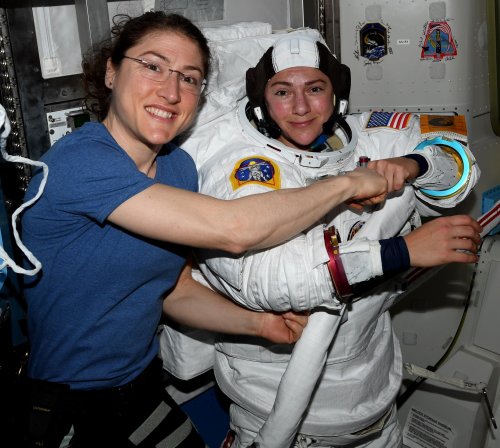
This was Koch’s fourth spacewalk and Meir’s first. Both women, selected as astronaut candidates in 2013, are on their first trip to work and live aboard the space station. Meir will be the 15th woman to spacewalk, and the 14th U.S. woman.
Get to know the astronauts
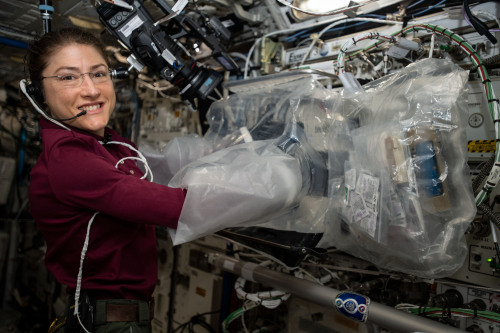
In addition to being an astronaut, Christina Koch is an engineer and physicist. Her career has taken her to extreme parts of the planet to conduct scientific field missions in places like the Antarctic South Pole and Greenland’s Summit Station. Prior to being selected as an astronaut candidate in 2013, she worked as an Electrical Engineer at our Goddard Space Flight Center’s Laboratory for High Energy Astrophysics.
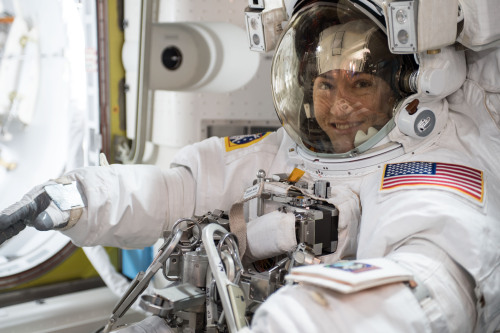
Koch left Earth on March 14, 2019, and is slated to set a record for the longest single spaceflight by a woman with an expected total of 328 days in space. Her extended mission will provide researchers the opportunity to observe the effects of long-duration spaceflight on a female body in preparation for human missions to the Moon and Mars.
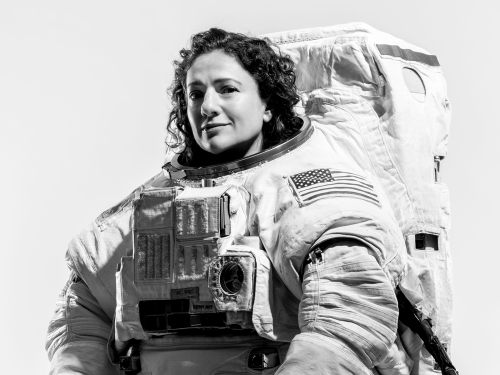
Jessica Meir dreamed of the day she would make it to space since the age of five. That dream became a reality on Wednesday, Sept. 25, 2019 as she left Earth on her first spaceflight – later floating into her new home aboard the International Space Station.
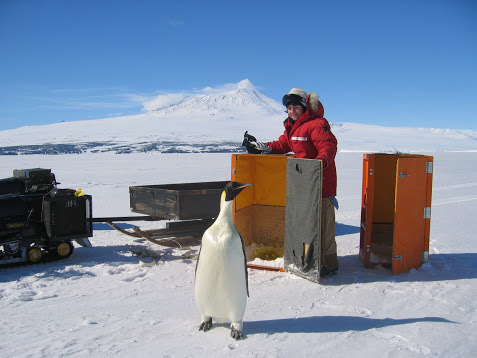
While Meir’s new home is more than 200 miles over the Earth, she is no stranger to extreme environments. She studied penguins in Antarctica and mapped caves in Italy – both of which prepared her for the ultimate extreme environment: space.
#AllWomanSpacewalk, what’s the deal?
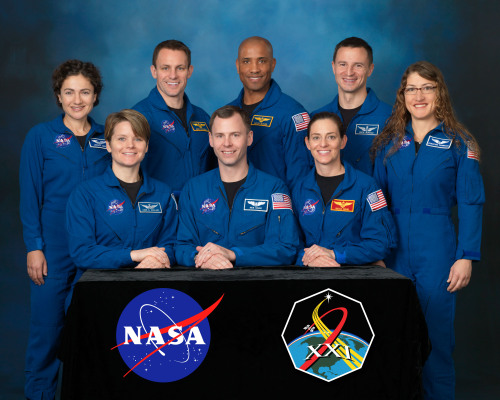
The all-woman spacewalk wasn’t something we purposefully planned; it is a testament to the increasing number of female astronauts in the space program. For example, Koch’s and Meir’s 2013 class of astronaut candidates was 50 percent women!
When asked in an interview about the importance of conducting her mission and this spacewalk, Koch said,
“In the end, I do think it’s important, and I think it’s important because of the historical nature of what we’re doing. In the past women haven’t always been at the table. It’s wonderful to be contributing to the space program at a time when all contributions are being accepted, when everyone has a role. That can lead in turn to increased chance for success. There are a lot of people who derive motivation from inspiring stories of people who look like them, and I think it’s an important story to tell.”
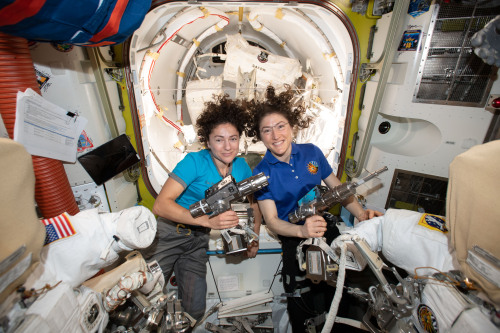
It’s important to note that spacewalks are not easy; astronauts typically describe them as the most physically challenging thing they do. Assignments are made on the basis of which astronauts are the best prepared to accomplish the tasks at hand under the conditions at the time. Today, Koch and Meir were the top astronauts for the job.
Women are no stranger to spacewalks!

While this was the first spacewalk to be conducted entirely by women, women are no strangers to spacewalks. Exactly 35 years and one week ago, Kathryn Sullivan (pictured above) made her own historic debut as the first U.S. woman to conduct a spacewalk. Since then, a total of 14 women (15 including Jessica) have ventured into the vacuum of space on 40 different spacewalks. Former Astronaut Peggy Whitson performed a record number of 10! From Astronauts to mission directors, women have been making their mark at the agency for decades now. A few of our recent pioneers are:
Astronaut Kate Rubins: First person to sequence DNA in space
Astronaut Peggy Whitson: First woman to command the ISS
Sandra Cauffman: Director of our Earth Science’s Division
Nicola Fox: Director of our Heliophysics Division
Lori Glaze: Director of our Planetary Science Division
Coming soon: The first woman to walk on the Moon
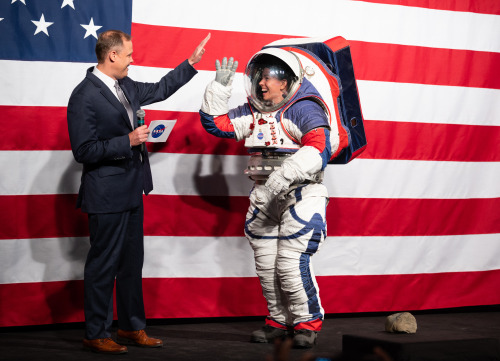
The first all-woman spacewalk is a milestone worth noting and celebrating as we look forward to putting the first woman and the next man on the Moon by 2024 with our Artemis lunar exploration program. With today’s historic event, we once again set a precedence for women to lead in space exploration.
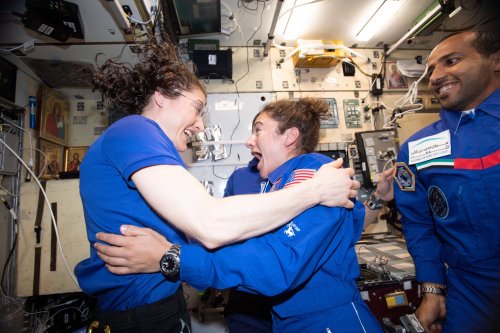
We hope achievements such as this provide inspiration to you all around the world, proving that hard work can lead you to great heights. This is not just a historic day for NASA, but a moment we can all feel proud of.
Didn’t have time to tune in? Check out the replay, here. Koch was wearing the spacesuit with red stripes, while Meir’s had no stripes.
If you’d like to keep up with Christian Koch and Jessica Meir’s work 254 miles above planet Earth, follow them on Twitter at @Astro_ Christina and @Astro_Jessica.
Be sure to follow us on Tumblr for your regular dose of space: http://nasa.tumblr.com

Ever wanted to ask a NASA astronaut a question? Here’s your chance!
NASA astronaut Nick Hague will be taking your questions in an Answer Time session on Wednesday, January 15 from 12pm - 1pm ET here on NASA’s Tumblr! Find out what it’s like to live and work 254 miles above our planet’s surface. Make sure to ask your question now by visiting http://nasa.tumblr.com/ask!
Nick Hague was selected as one of eight members of the 21st NASA Astronaut class in 2013. Hague was the first astronaut from his class to be assigned to a mission which launched on October 11, 2018. Unfortunately, he and his crewmate Alexey Ovchinin, of the Russian space agency Roscosmos, were forced to abort the mission when a rocket booster experienced a malfunction shortly after the launch of their Soyuz MS-10. The aborted spacecraft landed safely.
His first flight to the International Space Station was from March 2019 through October 2019 as a a part of the Expeditions 59 and 60 crew. Together, the crew conducted hundreds of experiments, including investigations into devices that mimic the structure and function of human organs, free-flying robots and an instrument to measure Earth’s distribution of carbon dioxide. While at the International Space Station, Hague conducted three spacewalks, totaling 19 hours and 56 minutes with a total of 203 days in space.

Nick Hague Fun Facts:
Hague was awarded the Order of Courage from the Russian Federation for his actions during the Expedition 57/58 launch abort.
Hague was selected for the Air Force Fellows program where he was assigned as a member of the personal staff in the U.S. Senate, advising on matters of national defense and foreign policy.
He was a top flight test engineer in the U.S. Air Force.
He deployed five months to Iraq in support of Iraqi Freedom, conducting experimental airborne reconnaissance.
He enjoys exercise, flying, snow skiing and scuba.
Follow Nick Hague on Twitter at @AstroHague and follow NASA on Tumblr for your regular dose of space.